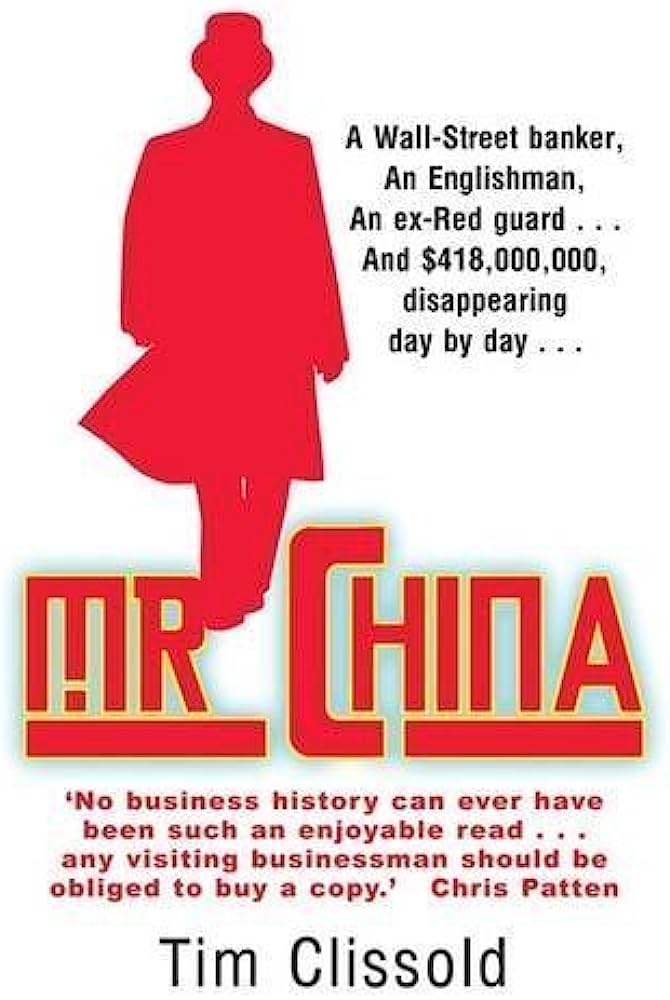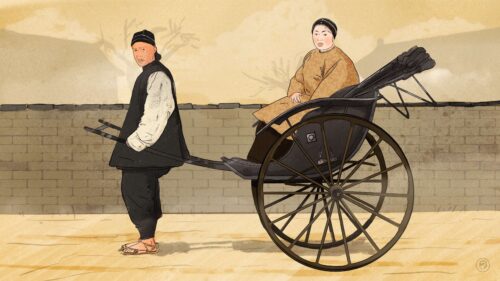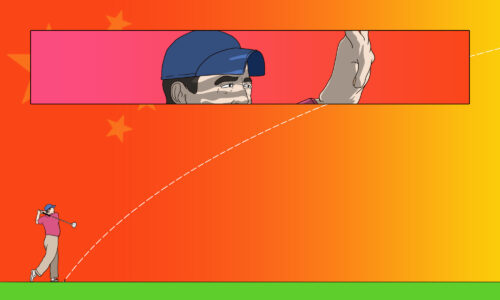This is book No. 26 on Paul French’s Ultimate China Bookshelf.

Blurbs:
“Mr. China is probably the best I’ve ever come across about China.”
—Financial Times
“Hard to put down…delightful for the engaging way in which it details the hardships of any businessman who lives on the road…at the same time a useful lesson for those who think there is anything easy about direct investment in brand new markets.”
—Economist
“Delightful…this trenchant, immensely entertaining study in the contradictions of Chinese capitalism should be required reading for all those who rush there in search of fortune.”
—Fortune
“An adventure tale. Clissold is a wonderful and compassionate narrator (with) a deep respect for the culture, language and history of China.”
—USA Today
“Lots of Western businessmen have war stories, but only Tim Clissold has written this funny book.”
—Newsweek
About the author:
Originally from England, Tim Clissold graduated in Physics and Theoretical Physics from Cambridge University. Working in Australia, London, and Hong Kong, he became fascinated with China and spent two years studying Mandarin in Beijing. He then co-founded a private equity group that “invested” 400 million American dollars in China. Where that stash of cash disappeared. He then wrote a book about the experience. Since then, he’s tried to track down distressed assets for Goldman Sachs and become involved in greenhouse gas reduction initiatives in China through the UN’s Clean Development Mechanism. Mr. China was an Economist Book of the Year and translated into 12 languages. He’ll never live it down. He now divides his time between China and the north of England.
China news, weekly.
Sign up for The China Project’s weekly newsletter, our free roundup of the most important China stories.
The book in 150 words:
Clissold was a co-founder (with Jack Perkowski) of a private equity group that “invested” $400 million in China right when China was first opening up to FDI. He ended up being the “on-the-ground” guy and so saw where all that stash of greenbacks went. Mr. China chronicles the numerous ways the fund lost money, the dumb assumptions, the dodgy practices of their partners, the perils of thinking you know what’s happening when you really have little idea.
Your free takeaways:
Everywhere Pat went, people were talking about China; whether they were enthusing about the opportunities for new markets or were nervously looking over their shoulder and fretting about the new entrepreneurs with their factories and cheap labour up the coast, they were talking about China. So Pat had taken a few trips up to Shanghai and Guangzhou — and he had liked what he saw.
I don’t quite remember how we got out, but I do remember the freezing air hitting me as we stumbled towards the cars. And I also remember the steady and purposeful stride of the Mayor as he walked over to a waiting group of officials to discuss our itinerary for the next day. It left me with a vague suspicion that whilst our cups had been filled with baijiu, his might have contained just the mineral water I had noticed on the sideboard. But, as the cars drove off, I put my mind more to controlling the waves of nausea welling up in the pit of my stomach.
When we saw the fax from Zhuhai that freezing November morning, we realized immediately that Wang had somehow committed our money to pay for machines that we’d never ordered. It looked as though the money was being channelled through one of Wang’s partners.
I never understood why the business didn’t make a profit. It was one of our larger companies in terms of sales, with good products and customers. It didn’t make sense and Board meetings became tetchy as we struggled to understand the figures. We were never briefed properly; Chen just tossed vast tomes of badly photocopied Chinese figures across the boardroom table when we arrived. Whenever we asked questions, different explanations would come from different members of the management team.
Why this book should be on your China bookshelf:
Essentially, Tim Clissold’s Mr. China is a blatant attempt to find a series of excuses over 300 pages for losing $418,000,000 in China in spectacular fashion. Of course, everyone is to blame — the Chinese partners, the American financiers, the investors, the Beijing government, local cadres, and, in the book’s saving grace, the author himself. How tempting it must have been to want to write a hit job on everyone but yourself? But Clissold resists, self-deprecates, and by minutely detailing his own flaws, shows that ultimately business success or failure is a collective endeavor.
What largely attracted readers to Mr. China back in the day was Clissold’s refreshing departure from the then-legion of suited-and-booted, ivory-toothed, Brooks Brothers types who descended upon China with their MBAs, tasseled loafers, and self-proclaimed deal-making skills. Most were handed their arse in a hat and sent back to whence they had come to rethink their career options. Most settled for Canary Wharf or Kalamazoo and never dirtied China’s shores again with their presence. Five-star hotel chains, Michelin-starred restaurants, and a cast of hangers-on made some money from them, but little tangible business got done. Their MBAs weren’t worth the parchment they were printed on back home, their loafers got splattered with gutter oil, their teeth stained with cups of thin green tea, and their suits wrinkled and damp in the heat.
But some persevere. Indeed, some have nowhere else to go, it seems. China calls them like a siren they cannot resist. Jack Perkowski thought he could make billions by spending millions; Clissold kinda liked the place and jumped in feet first. The contrast between the larger-than-life hubris of Perkowski and the self-deprecating commercial despair of Clissold makes this one of the great comedy duos of all time — we laugh, we cry, we root for them, even though we know they failed.
Clissold’s book came amid a less-than-ultimate-China-bookshelf explosion of self-congratulatory tomes on business in China, often written by the dreaded “consultants” who’d never registered a WFOE or manned a Rep Office in their lives, or minor business school professors who had rarely been closer to the sharp end of doing business in China than making big decisions at the Shanghai Hilton breakfast buffet table. To say Mr. China was a refreshing blast of chilled air in the room in 2004 is to undersell it. For those in the trenches it was proof that you were not alone. Their bank account bled red, too. We were a tribe. And coming just a couple of years after reality checks like Joe Studwell’s The China Dream (book No. 2 on the Ultimate Shelf) it reinforced the difficulties business and joint ventures faced in China.
We were all in this together, we were mostly all failing; everyone talked big, boasting was the name of the game in the hope things would turn around. Tim Clissold’s Mr. China was like the kid that calls out the emperor for having no clothes. We all knew it, but someone had to say it.
Next time:
Less you think the English were having all the fun, we need to look at one more business case study before moving on to pastures new. Long before Mr. China showed how to lose money and Wham! took the stage at the Workers’ Gymnasium, all-American AMC formed a joint venture to produce Jeeps in Beijing. It was 1979 — prehistoric in contemporary China business terms. It was to be a wild ride — not least because China’s roads were totally wild! — because making a half-decent Jeep in China and then keeping them on the road was one hell of a challenge…
Check out the other titles on Paul French’s Ultimate China Bookshelf.







